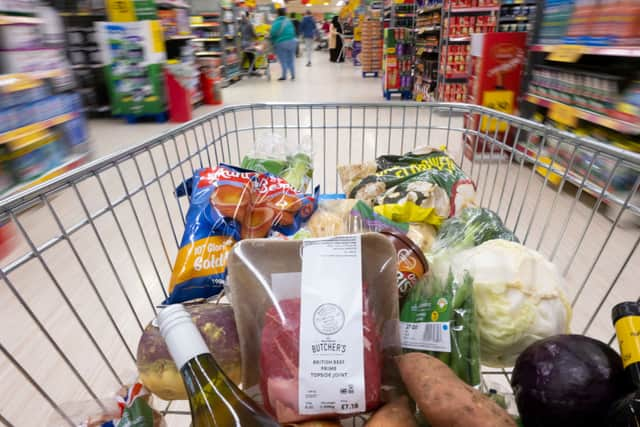UK food prices inflation ‘slows to lowest rate since September 2022’, BRC supermarket shop survey shows
and live on Freeview channel 276
Food inflation has slowed to its lowest rate since September 2022, the latest supermarket prices survey by retailer trade body the British Retail Consortium (BRC) has shown.
According to its BRC-NielsenIQ Shop Price Index, which analysed shelf prices between 1 and 7 August, the rate of food price hikes slowed from 13.4% in July to 11.5% this month. It helped to ease overall shop price inflation from 7.6% to 6.9%.
Advertisement
Hide AdAdvertisement
Hide AdIn practice, the overall inflation figure means a typical shop costs 6.9% more than it did a year ago. An item that would have set you back £1 in the first week of August 2022 now costs an extra 7p, on average. While inflation is slowing, it still means prices are rising - just not as rapidly as they were before.
It all comes after official inflation statistics from the Office for National Statistics (ONS) showed the headline rate of inflation fell from 7.9% to 6.8% between June and July. However, food prices continued to grow well above this rate, soaring 14.8% year-on-year.
The situation means consumers are likely to still be feeling a severe cost of living squeeze. Wages are still lagging behind inflation, which means people are continuing to lose purchasing power. At the same time, this winter’s energy bills are set to be higher compared to last year despite a reduction in the Ofgem energy price cap.
‘Better news’ on your supermarket shop
The BRC’s latest survey suggests food inflation is continuing to slow year-on-year. Price rises in fresh produce aisles fell from 14.3% to 11.6% - the lowest figure since August 2022 - with decelerating meat and potato prices driving the change.
Advertisement
Hide AdAdvertisement
Hide AdMeanwhile, ambient food items saw their inflation rate slow from 12.3% to 11.3%. Cooking oils helped to slow the rate, although the BRC said the government’s alcohol duty changes kept inflation higher than it would otherwise have been.


However, despite the overarching food inflation rate slowing compared to 2022, price hikes accelerated marginally month-on-month. August’s prices were 0.6% above July’s, and followed a 0.3% rise the previous month.
Elsewhere in stores, inflation remained static at 4.7%. This figure was below the three-month average rate of 5%. With overall inflation running at 6.9%, according to the BRC, prices are rising at their slowest rate since October 2022.
Helen Dickinson, the BRC’s CEO, said that while the figures were “better news” for shoppers, there continued to be challenges that could see inflation creep up again. “While inflation is on course to continue to fall thanks to retailers’ efforts, there are supply chain risks for retailers to navigate,” she said.
Advertisement
Hide AdAdvertisement
Hide Ad“Russia’s withdrawal from the Black Sea Grain Initiative and its targeting of Ukrainian grain facilities, as well as poor harvests across Europe and beyond, could serve as potential roadblocks to lower inflation. A potential £400m hike to business rates bills from next April would certainly jeopardise efforts to tackle inflation unless the Chancellor intervenes.”
Trust in supermarkets at ‘decade low’
The BRC’s latest inflation figures have come as a survey by consumer watchdog Which? found trust in supermarkets has fallen to its lowest point since the horsemeat scandal in 2013.
Its monthly consumer insight tracker for August gave the sector a ‘trust score’ of 30. The scale goes from minus 100 to 100. In the wake of the horsemeat scandal a decade ago, the tally fell as low as 24, with retailers’ best performance coming during the first Covid pandemic lockdown when they scored 68.
Which? found consumers are now equally as worried about food price inflation and energy bills, with 85% listing the issues as a concern. The majority of shoppers indicated they did not trust supermarkets to act in their best interest, with 18% saying they did not trust the sector.


Advertisement
Hide AdAdvertisement
Hide Ad“Month after month of soaring food prices has seen trust in supermarkets plummet to a 10-year low – comparable to the dark days of the horsemeat scandal,” said head of strategic insight at the publication, Katie Alpin.
“The cost of the weekly shop is now on a par with energy bills as the biggest worry for millions of households. Supermarkets have the power to ease the huge pressure faced by shoppers, especially families and those on low incomes, by putting low-cost budget range items in hundreds of more expensive convenience stores. Which? research has found that these stores rarely, if ever, stock the cheapest products.”
The survey also recorded troubling signs that the cost of living crisis is continuing to decimate household budgets. It showed 78% of consumers had adjusted their habits in response to high food prices, with 54% buying cheaper products. Of this tally, 48% were opting for budget range items, and 24% were going without some food items. Roughly one in seven shoppers (15%) said they were having to skip meals in a bid to cope with rising food costs.
Comment Guidelines
National World encourages reader discussion on our stories. User feedback, insights and back-and-forth exchanges add a rich layer of context to reporting. Please review our Community Guidelines before commenting.
